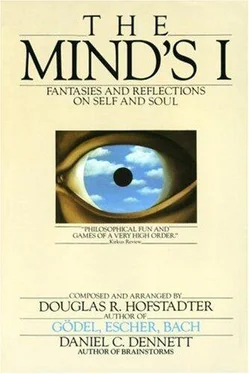CRAB: Well, we must absolutely put one of these priceless records on, immediately! And how can I ever thank the two of you?
TORTOISE: You have already thanked us plentifully, with this delicious tea which you have prepared.
(The Crab slides one of the records out of its jacket and puts it on. The sound of an incredibly masterful harpsichordist fills the room, in the highest imaginable fidelity. One even hears—or is it one’s imagination?—the soft sounds of Bach singing to himself as he plays....)
CRAB: Would any of you like to follow along in the score? I happen to have a unique edition of the Well-Tempered Clavier, specially illuminated by a teacher of mine who happens also to be an unusually fine calligrapher.
TORTOISE: I would very much enjoy that.
(The Crab goes to his elegant glass-enclosed wooden bookcase, opens the doors, and draws out two large volumes.)
CRAB: Here you are, Mr. Tortoise. I’ve never really gotten to know all the beautiful illustrations in this edition. Perhaps your gift will provide the needed impetus for me to do so.
TORTOISE: I do hope so.
ANTEATER: Have you ever noticed how in these pieces the prelude always sets the mood perfectly for the following fugue?
CRAB: Yes. Although it may be hard to put it into words, there is always some subtle relation between the two. Even if the prelude and fugue do not have a common melodic subject, there is nevertheless always some intangible abstract quality which underlies both of them, binding them together very strongly.
TORTOISE: And there is something very dramatic about the few moments of silent suspense hanging between prelude and fugue—that moment where the theme of the fugue is about to ring out, in single tones, and then to join with itself in ever-increasingly complex levels of weird, exquisite harmony.
ACHILLES: I know just what you mean. There are so many preludes and fugues which I haven’t yet gotten to know, and for me that fleeting interlude of silence is very exciting; it’s a time when I try to second-guess old Bach. For example, I always wonder what the fugue’s tempo will be: allegro or adagio? Will it be in 6/8 or 4/4? Will it have three voices or five—or four? And then, the first voice starts.... Such an exquisite moment.
CRAB: Ah, yes, well do I remember those long-gone days of my youth, the days when I thrilled to each new prelude and fugue, filled with the excitement of their novelty and beauty and the many unexpected surprises which they conceal.
ACHILLES: And now? Is that thrill all gone?
CRAB: It’s been supplanted by familiarity, as thrills always will be. But in that familiarity there is also a kind of depth, which has its own compensations. For instance, I find that there are always new surprises which I hadn’t noticed before.
ACHILLES: Occurrences of the theme which you had overlooked?
CRAB: Perhaps—especially when it is inverted and hidden among several other voices, or where it seems to come rushing up from the depths, out of nowhere. But there are also amazing modulations which it is marvelous to listen to over and over again, and wonder how old Bach dreamt them up.
ACHILLES: I am very glad to hear that there is something to look forward to, after I have been through the first flush of infatuation with the Well-Tempered Clavier —although it also makes me sad that this stage could not last forever and ever.
CRAB: Oh, you needn’t fear that your infatuation will totally die. One of the nice things about that sort of youthful thrill is that it can always be resuscitated, just when you thought it was finally dead. It just takes the right kind of triggering from the outside.
ACHILLES: Oh, really? Such as what?
CRAB: Such as hearing it through the ears, so to speak, of someone to whom it is a totally new experience—someone such as you, Achilles. Somehow the excitement transmits itself, and I can feel thrilled again.
ACHILLES: That is intriguing. The thrill has remained dormant somewhere inside you, but by yourself, you aren’t able to fish it up out of your subconscious.
CRAB: Exactly. The potential of reliving the thrill is “coded,” in some unknown way, in the structure of my brain, but I don’t have the power to summon it up at will; I have to wait for chance circumstance to trigger it.
ACHILLES: I have a question about fugues which I feel a little embarrassed about asking, but as I am just a novice at fugue-listening, I was wondering if perhaps one of you seasoned fugue-listeners might help me in learning? …
TORTOISE: I’d certainly like to offer my own meager knowledge, if it might prove of some assistance.
ACHILLES: Oh, thank you. Let me come at the question from an angle. Are you familiar with the print called Cube with Magic Ribbons, by M. C. Escher?
TORTOISE: In which there are circular bands having bubblelike distortions which, as soon as you’ve decided that they are bumps, seem to turn into dents—and vice versa?
ACHILLES: Exactly.
CRAB: I remember that picture. Those little bubbles always seem to flip back and forth between being concave and convex, depending on the direction that you approach them from. There’s no way to see them simultaneously as concave and convex—somehow one’s brain doesn’t allow that. There are two mutually exclusive “modes” in which one can perceive the bubbles.
ACHILLES: Just so. Well, I seem to have discovered two somewhat analogous modes in which I can listen to a fugue. The modes are these: either to follow one individual voice at a time, or to listen to the total effect of all of them together, without trying to disentangle one from another. I have tried out both of these modes, and, much to my frustration, each one of them shuts out the other. It’s simply not in my power to follow the paths of individual voices and at the same time to hear the whole effect. I find that I flip back and forth between one mode and the other, more or less spontaneously and involuntarily.

Cube with Magic Ribbons (M. C. Escher, lithograph, 1957)
ANTEATER: Just as when you look at the magic bands, eh?
ACHILLES: Yes. I was just wondering… does my description of these two modes of fugue-listening brand me unmistakably as a naïve, inexperienced listener, who couldn’t even begin to grasp the deeper modes of perception which exist beyond his ken?
TORTOISE: No, not at all, Achilles. I can only speak for myself, but I too find myself shifting back and forth from one mode to the other without exerting any conscious control over which mode should be dominant. I don’t know if our other companions here have also experienced anything similar.
CRAB: Most definitely. It’s quite a tantalizing phenomenon, since you feel that the essence of the fugue is flitting about you, and you can’t quite grasp all of it, because you can’t quite make yourself function both ways at once.
ANTEATER: Fugues have that interesting property, that each of their voices is a piece of music in itself; and thus a fugue might be thought of as a collection of several distinct pieces of music, all based on one single theme, and all played simultaneously. And it is up to the listener (or his subconscious) to decide whether it should be perceived as a unit, or as a collection of independent parts, all of which harmonize.
ACHILLES: You say that the parts are “independent,” yet that can’t be literally true. There has to be some coordination between them, otherwise when they were put together one would just have an unsystematic clashing of tones—and that is as far from the truth as could be.
ANTEATER: A better way to state it might be this: if you listened to each voice on its own, you would find that it seemed to make sense all by itself. It could stand alone, and that is the sense in which I meant that it is independent. But you are quite right in pointing out that each of these individually meaningful lines fuses with the others in a highly nonrandom way, to make a graceful totality. The art of writing a beautiful fugue lies precisely in this ability, to manufacture several different lines, each one of which gives the illusion of having been written for its own beauty, and yet which when taken together form a whole, which does not feel forced in any way. Now, this dichotomy, between hearing a fugue as a whole and hearing its component voices is a particular example of a very general dichotomy, which applies to many kinds of structures built up from lower levels.
Читать дальше












